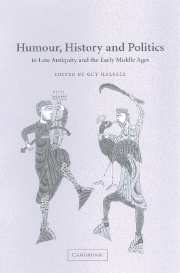Book contents
- Frontmatter
- Contents
- Notes on contributors
- Preface
- List of abbreviations
- Introduction: ‘Don't worry, I've got the key’
- PART I THE FATE OF HUMOROUS WRITING
- PART II HUMOUR AND THE POLITICS OF DIFFERENCE
- PART III HUMOUR, HISTORY AND POLITICS IN THE CAROLINGIAN WORLD
- 6 ‘He never even allowed his white teeth to be bared in laughter’: the politics of humour in the Carolingian renaissance
- 7 Alcuin's Disputatio Pippini and the early medieval riddle tradition
- 8 Laughter after Babel's fall: misunderstanding and miscommunication in the ninth-century west
- Index
6 - ‘He never even allowed his white teeth to be bared in laughter’: the politics of humour in the Carolingian renaissance
Published online by Cambridge University Press: 24 July 2009
- Frontmatter
- Contents
- Notes on contributors
- Preface
- List of abbreviations
- Introduction: ‘Don't worry, I've got the key’
- PART I THE FATE OF HUMOROUS WRITING
- PART II HUMOUR AND THE POLITICS OF DIFFERENCE
- PART III HUMOUR, HISTORY AND POLITICS IN THE CAROLINGIAN WORLD
- 6 ‘He never even allowed his white teeth to be bared in laughter’: the politics of humour in the Carolingian renaissance
- 7 Alcuin's Disputatio Pippini and the early medieval riddle tradition
- 8 Laughter after Babel's fall: misunderstanding and miscommunication in the ninth-century west
- Index
Summary
Humour is scarcely a topic that looms large in Carolingian history. The overriding seriousness of a dynasty that saw its mission as the creation of a Christian society dominated not only contemporary discourse, but also that of modern interpreters. In a political culture wherein argument was prosecuted whenever possible with pen rather than sword, written texts were used to elevate personal and factional interests to the moral high ground. In this cultural context – or at least in recent work upon it – there has often seemed little space for humour: a good vehicle for ridiculing rivals but a poor one for appropriating rectitude in past, present and future.
The period's modern students may have accentuated the humourlessness of Carolingian political discourse. Pamphlet wars make for plentiful sources, and allow modern historians to apply, consciously and unconsciously, criteria for the evaluation and selection of those sources. Given a – by early medieval standards – superabundance of material, writers who used humour to drive home their point have tended to suffer at the hands of modern critics and find themselves largely excluded from the approved canon of ‘reliable’ sources. Thus Notker of St-Gall, condemned as a worthless gossip earlier in the twentieth century, has only slowly been rehabilitated, and then primarily as a source for socio-cultural history.
- Type
- Chapter
- Information
- Publisher: Cambridge University PressPrint publication year: 2002
- 8
- Cited by



